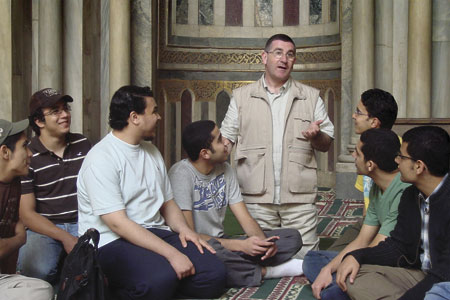
A Priestly Muslim
Issue 80 May 2011
Having been an ordained Catholic priest, Idris Tawfiq spends his time now talking about the wonders of being a Muslim. Khadija Gulamhusein caught up with him on a visit to England.
When Idris Tawfiq walked into the emel offices on a cold Friday evening, I felt instantly at ease. He had a gentle manner about him and a soft-spoken disposition that did not mask his passion for religion and his work. We spoke in-depth about Islam, Christianity, and his interfaith work.
I asked him what it was that first attracted him to Islam. I had assumed that his response would refer to the theological or ethical aspects of the religion. Instead, he nostalgically relayed a life-changing encounter he experienced on a visit to Egypt.
“My introduction to Islam came from a little boy on the street in Cairo, cleaning shoes with small plastic flip-flops on his feet. He saw my white skin and greeted me with assalamu alaikum. For 40 years in Britain, I’d seen Muslims; I’d seen them in the streets, and I knew what the TV told me — that Muslims chop your hands off and they beat women, but that little boy started the whole journey off.” Tawfiq’s credits him with all that he has achieved.
“I told the audience at Manchester Metropolitan University about the boy. I told them that on Judgement Day he would get the shock of his life. His good deeds and bad deeds will be read out from a clear book, and when his good deeds are finished, he will think, ‘That’s all the good I’ve done in this life.’ But then the angels will read out the shahadas that have been declared because of him, the books that have been written on Islam because of him, the articles, the TV programmes, this interview itself—all because of him.”
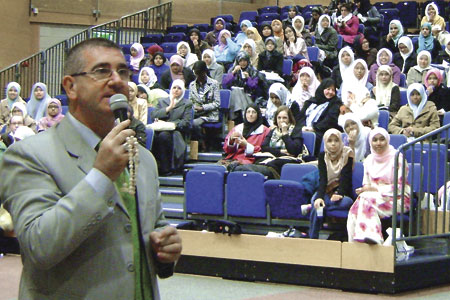
It is obvious from speaking to Tawfiq that Islam resonates deeply with him. “What I love about Islam is its simplicity.” However, he strongly believes that Muslims overcomplicate their religion, both for themselves and when explaining it to non-Muslims. “We use religious language and confuse people. Islam can be summed up in two simple statements: one, there is a God, and two, that God speaks to His creation. That is Islam. That’s the message of Islam that’s existed since the beginning of time.”
For Tawfiq, the simplicity of Islam ensures its universal appeal. However, he worries about the growing trend towards trivialisation. “Islam speaks to the hearts of all people, everywhere. But as Muslims, sometimes we concentrate on trivial, unimportant things when the world at large is thirsting for God. They don’t know they’re thirsting for God, and the emptiness in their lives is filled by drunkenness, violence, hooliganism, shoes, shopping, and of all manner of things.“
He sees the reaction to Princess Diana’s death as indicative of this longing. “When Princess Diana died, people were crying in the streets. I can see now that people weren’t mourning the death of a princess. They were mourning the death of goodness; the loss of beauty in our life, and they wept. Because people want goodness, they look for goodness, and for happiness, and peace and beauty.”When Idris speaks about Islam, he refuses to be apologetic. For him, Islam is a religion with no flaws, and which can rebut any criticism that is directed at it. “Islam is perfect. There is nothing in Islam that we are to be ashamed of, nothing at all. We can stand on a desk and tell the world about anything in Islam. But Muslims are not perfect, and often don’t know about the beauty of their religion.” So I ask him what is the cure for reversing negative perceptions on Islam.
“Most people in the UK will never pick up the Qur’an; they won’t go into an Islamic bookshop to buy a book about Islam, or go into a mosque. The only Qur’an they will ever read is you and I. So how do we reverse wrong impressions? Well, first of all we do it by the goodness and the honesty and the sincerity of our lives as Muslims; by praying and by reading the Qur’an; and by following the sunnah of the Prophet.”
It is this non-deterministic, personal responsibility focus of Islam that Tawfiq finds particularly attractive. “For me the beauty of Islam is that there are no popes, priests or mediators between God and human beings. Islam is for grown-ups. It is not for kids. In this life, we can really do whatever we want; God doesn’t force us to do anything. But on Judgement Day, we have to give an account of the choices we have made in this life. That’s the beauty of Islam.”
Hearing him speak about Islam, I find myself forgetting that he was once Catholic and a priest in the Church. So, I draw our conversation to his life before Islam. “I was born and grew up in the North of England in an ordinary family for whom religion wasn’t particularly important,” admits Tawfiq. “We were the types of Catholics who went to church on a Sunday, but not enough to merit us being described as especially religious.”
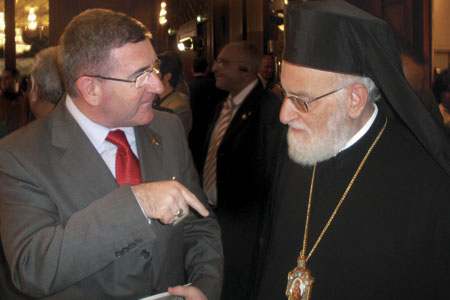
Despite coming from a moderately religious family, Tawfiq tells me of his long-standing attraction to religion and “all things religious.” So much so that at the end of his university education, entering a religious order felt like the natural next step. So, 15 years of his life were then spent teaching about the Catholic faith and living life as a practicing Catholic. But as the years went on, he wanted something more. “After some years, I approached the Bishop and told him that I’d like to take my path a step further and take a wider role in the community as a priest.”
His recollections of his time as a priest are nothing but positive and he sees his time in the Church as all part of God’s divine plan for his life. “At the time when I was ordained, it was a very privileged occasion to be a priest, to be allowed into intimate moments in peoples’ lives: baptising their children, marrying them, burying them, and hearing their confessions.”
“From the moment I was born, I see just one straight line. All the experiences in my life lead me to this very point. You know, when I was sitting in lecture halls in Rome training to be a priest, I can see now that I was training to be carrying out this interview.”
After many years though, Tawfiq decided to leave the priesthood but with no intention of leaving the Church. “I was perfectly happy as a Catholic. But after I left the priesthood, within a year or so Christianity slipped away and Islam became more and more important, until eventually I embraced Islam.”
He tells me about how his life changed after his chance encounter with the little boy in Egypt. “When I got back to the UK, I began to get to know Islam and Muslims. I started teaching at a school where there were many Muslim children, and I came to see firsthand that they were not what the TV was telling me. And the Christian part just kind of fell away while the Muslim features grew in importance. In school, when I would teach about Prophet Muhammad, I’d find tears in my eyes or a lump in my throat when I spoke about the pillars of Islam.”
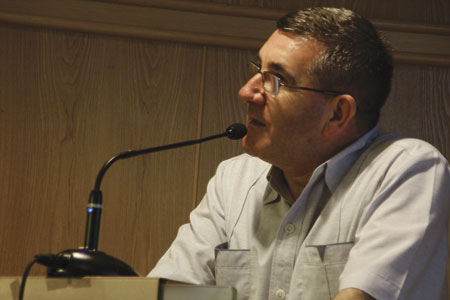
Tawfiq is full of stories. He is always drawing parallels with the experiences he has had in life and his spiritual journey to Islam. “In Cairo, there’s a bazaar, like the Grand Bazaar in Turkey, and they sell everything — gold, spices, wooden things and jewellery. Once, I approached one of the stalls, and the young man behind it beamed at me and said, ‘I’ve been waiting for you all day’.” I think we must have realised that God Almighty had been waiting for us all day. I know now that from the beginning of time, He had planned that I would be sitting here today. But He gives us time; He doesn’t force anything we do. He gave me many experiences in life, and when the time was right He brought me to Islam with no pushing or force, but just kind of saying, ‘Look, I have been waiting for you. It’s time to come in now, out of the cold; come in the door’.”
I find out that Tawfiq spends half the year in Egypt, where he lives, writing about Islam. The other half he spends travelling the world, spreading the message of Islam and engaging in interfaith dialogue. What motivates him to this interfaith work, I ask him. He tells me that goodness is goodness, and that we should hold on to it wherever we find it. “We shouldn’t feel threatened by goodness. We should embrace goodness wherever it comes from, because it comes from God; it doesn’t come from the devil. So, if we meet a good Jew, or a good Methodist, we should embrace them. All we’re saying is that people who believe in God and worship Him — that is good.”
But for Tawfiq, engaging in interfaith dialogue does not involve conceding what it is to be Muslim. “It’s not about giving up anything we believe as Muslims. And honesty is vital. I have met some very important religious figures from all over the world and sometimes you need to say to them right from the start. ‘I don’t want you to mistake what we’re doing here. I am not giving up one jot of what it is to be Muslim. Even though I am fully Muslim and I declare that there is no God but Allah and that Muhammad is his prophet, I still respect your religion.’”
For Tawfiq, this respect for other faiths and their beliefs is fundamentally important. “People will listen to you if you are respectful of them and you are not unduly critical. If you’re harsh to people, they become defensive and don’t want to hear what you’re saying.”
I steer our conversation to the books he has written. I am curious as to the reasoning behind his titles and what has driven him to write them. “I write because I want to explain Islam in a language that ordinary people, both Muslim and non-Muslim, can understand. The first book I ever wrote was called Gardens of Delight, a Simple Introduction to Islam. I wrote in order to explain to my English friends in Egypt what Islam is all about. I walked into the staff room in a school I was teaching at and heard the non-Muslim teachers saying to one another, ‘Oh no, Ramadan is coming again. People will be worse tempered because they’re not smoking; the traffic will be worse; and it will be difficult to get things done.’ And I thought to myself, ‘How very sad. Is this what non-Muslims think about Ramadan and the image of Islam we portray?’ So I simply put pen to paper and wrote Gardens of Delight to tell people about Islam.”
In the same vein, six of his books look to address questions about Islam from different perspectives. “I wrote my middle six books when I was in Damascus for two years; they were part of a series called ‘Ask about Islam’. And the idea behind these books was to speak about Islam in a simple and uncomplicated way.”
His last book, however, has a slightly different focus. It is much more political and motivated by a very personal experience he had whilst in Egypt. “The book is called Looking for Peace in the Land of the Prophets. And it is about Palestine. During the Gaza atrocity, I visited some of the wounded in a hospital in Cairo for a newspaper story. The interview lasted four hours. I just could not drag myself away. At the end I said to them, ‘Look, I have no money in the bank; I have no money in my pocket, but I promise you, from this day on, wherever I go and tell people about Islam, I will tell them about you and I will tell them the truth about Palestine. So, my last book tries to speak to Muslims and non-Muslims, and simply says to them, ‘You have been presented with one version of this story for the last 60 years. I just want you to listen to the Muslim version of what happened.’”
Our interview ends and it is time for his photoshoot. He adjusts his tie and asks me if it’s straight. “It’s perfect,” I reply, and with a twinkling smile, Tawfiq turns to leave.
Bookmark this |
|
Add to DIGG |
|
Add to del.icio.us |
|
Stumble this |
|
Share on Facebook |
|
Share this |
|
Send to a Friend |
|
Link to this |
|
Printer Friendly |
|
Print in plain text |
|

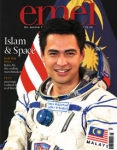
Comments
1 Comment
1
Mani
4 May 11, 19:20
Keep it up Sir, I pray for you and please suggest me how i preach islam. May Allah fulfill your all desires.